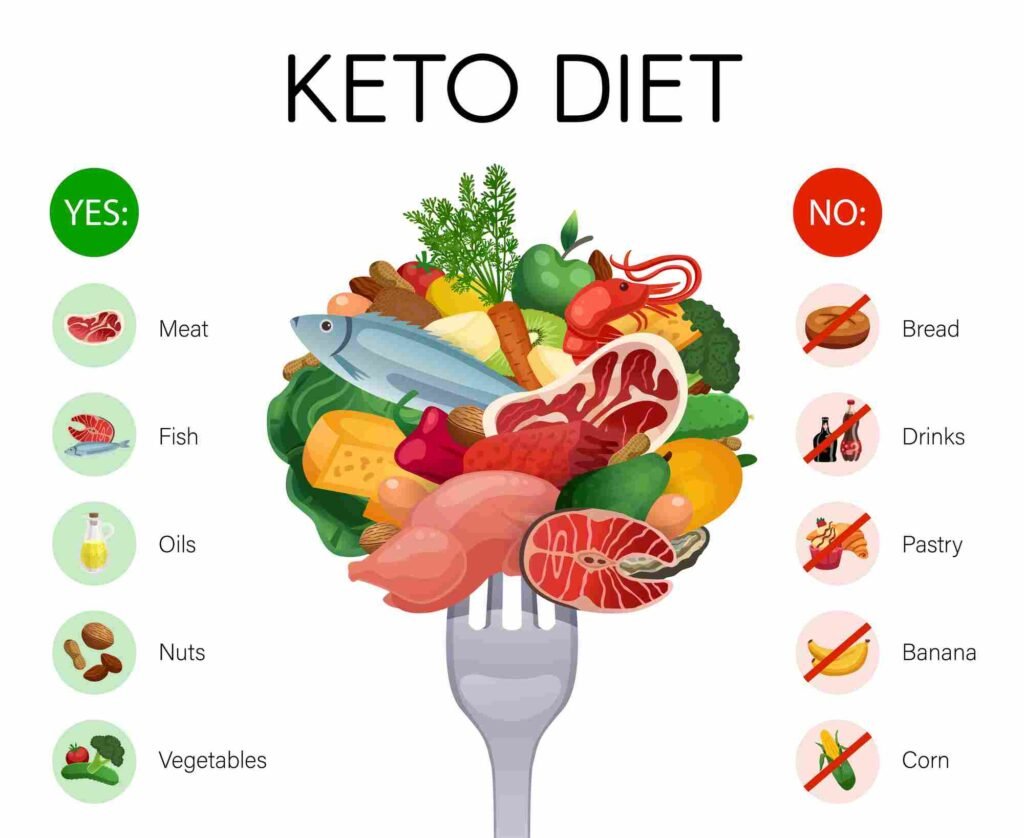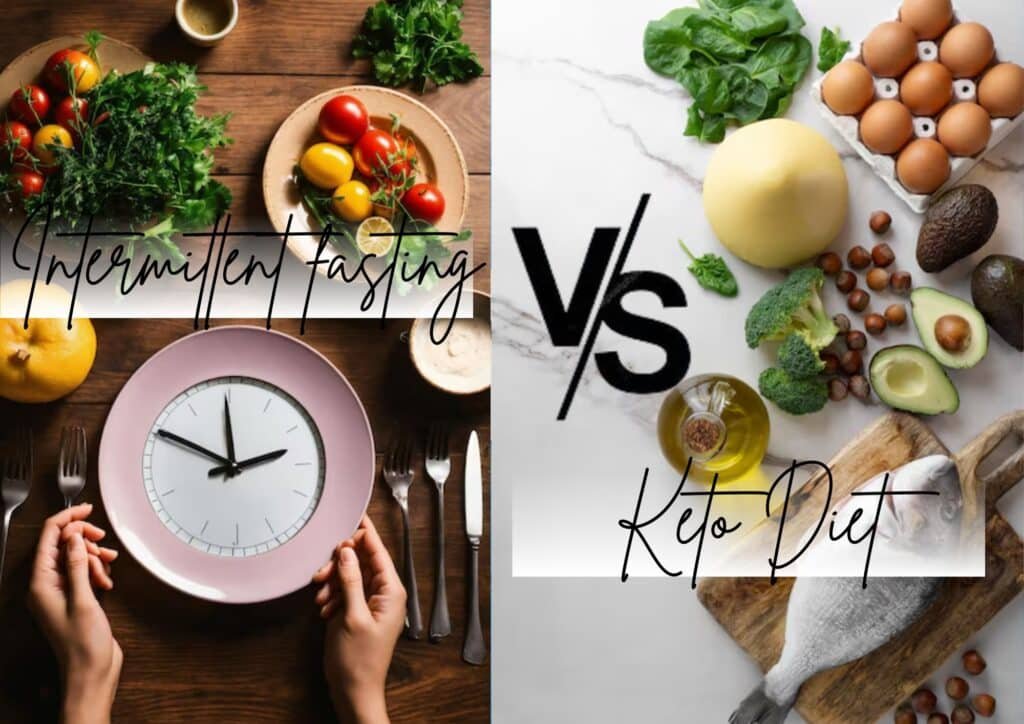In the world of weight loss and metabolic health, two approaches have become prominent in recent years: intermittent fasting and the ketogenic diet. Both promise significant reductions in body weight, improved insulin sensitivity, and protection against health conditions like heart disease and Alzheimer’s disease. But how do they work? Intermittent Fasting vs Keto – which is better for you? Let’s explore and decide between intermittent fasting vs keto.

What Is Intermittent Fasting?
Intermittent fasting (IF) is an innovative eating pattern that alternates between distinct periods of fasting where no calories are consumed and designated windows for eating. Unlike conventional diets that focus primarily on calorie reduction or food choices, IF emphasizes the timing of your meals. This approach can be particularly appealing, as it allows for flexibility in food choices during the eating periods, and weight loss success. Common methods of intermittent fasting include:

1. Time-Restricted Eating (16:8 Method): In this approach, you abstain from food for 16 consecutive hours each day, reserving an 8-hour window for eating. For instance, you might choose to eat between 12 PM and 8 PM, allowing your body time to utilize and deplete stored energy.
2. Alternate-Day Fasting: This method entails consuming a normal diet on one day and then sharply restricting calorie intake to just 500–600 calories the following day. This cycle continues every other day, promoting both metabolic adjustments and weight loss.
3. 5:2 Diet: In this plan, you eat normally for five days of the week while dedicating two non-consecutive days to fasting, wherein caloric intake is significantly reduced. This allows for a balanced approach that does not require daily extreme restriction.
How Does Intermittent Fasting Work?
During the fasting phase, your body taps into its stored glucose reserves. Once these are exhausted, they transition to burning body fat for energy. This process not only aids in fat loss but also leads to lower insulin levels, which subsequently enhances insulin sensitivity. A recent systematic review conducted by UC Davis in 2023 found that implementing intermittent fasting can decrease blood sugar levels by as much as 6% and reduce belly fat by 4–7% over 12 weeks.
Key Health Benefits of Intermittent fasting
– Weight Loss: Intermittent fasting often significantly decreases overall caloric intake, promoting fat burning and weight loss.
– Improved Metabolic Health: Regular practitioners may experience lowered cholesterol levels, reduced blood pressure, and favorable markers related to cardiovascular health, which may contribute to a lower risk of heart disease.

– Brain Health: Preliminary animal studies indicate that intermittent fasting might slow the cognitive decline associated with Alzheimer’s disease, highlighting its potential neuroprotective benefits.
– Simplicity: One of the most appealing aspects of intermittent fasting is its straightforward nature; there’s no need to meticulously track macronutrients like carbs or fats, focus simply on when to eat.
Side Effects of Intermittent fasting
Despite its advantages, intermittent fasting can come with certain drawbacks:
– Many individuals may experience feelings of hunger, fatigue, or headaches during fasting periods, especially when first beginning the regimen.
– There is a risk of nutrient deficiencies if fasting individuals fail to consume nutrient-dense foods, such as a variety of vegetables, whole grains, and high-quality proteins, during eating windows.
– Additionally, intermittent fasting may not be appropriate for everyone. Individuals with a history of eating disorders or those with medical conditions like diabetes should seek professional medical guidance before adopting this eating pattern to ensure safety and effectiveness.
Pro Tip: Start with a 12-hour fast (e.g., 7 PM–7 AM) and gradually increase. Black coffee and water are allowed during fasting!
What Is the Ketogenic Diet?
The ketogenic diet, often referred to as “keto,” is a specialized dietary regimen characterized by a high-fat diet, typically comprising 70–80% of daily calories from fats, about 20% from proteins, and a minimal 5–10% from carbohydrates. This unique nutritional approach is designed to induce a metabolic state known as ketosis. During ketosis, the liver transforms fatty acids into ketone bodies, which then serve as the primary fuel source for the body, effectively replacing the usual reliance on glucose derived from carbohydrates.

How Does Keto Work?
The ketogenic diet works by significantly reducing carbohydrate consumption, typically to less than 50 grams per day. As carbohydrate intake falls, the body must adapt by switching from utilizing glucose as its main energy source to burning the fat stores instead. This transition can lead to a notable suppression of appetite, often resulting in rapid body fat. A comprehensive systematic review published in 2022 found that individuals following a ketogenic diet tend to lose weight at a pace of 2 to 3 times greater in the short term compared to those adhering to traditional low-fat diets.
Key Health Benefits of Keto Diet
– Rapid Weight Loss: Initially, individuals may lose a considerable amount of water weight; this is followed by a steadier reduction of body fat as the body adapts to its new energy source.
– Improved Insulin Sensitivity: The ketogenic diet can play a pivotal role in managing conditions such as polycystic ovary syndrome (PCOS) and type 2 diabetes by enhancing insulin sensitivity.
– Neurological Benefits: The ketogenic diet has a long history of use dating back to the 1920s for the treatment of epilepsy. Recent research is beginning to uncover a potential link between ketone bodies and improved outcomes for individuals suffering from Alzheimer’s disease.
Side Effects of Keto Diet
– Keto Flu: As the body transitions into a state of ketosis, many individuals experience what is commonly referred to as the “keto flu.” This can manifest as headaches, nausea, fatigue, and other flu-like symptoms in the initial week.
– Nutrient Deficiencies: If not carefully planned, the diet can lead to deficiencies in essential nutrients like fiber, vitamins, and minerals, especially if individuals neglect to include healthy fats (such as olive oil and avocados) and a variety of vegetables in their meals.
– Long-term Risks: There are concerns regarding potential long-term effects that may include elevated cholesterol levels and increased strain on the kidneys, particularly due to the high protein intake.
Pro Tip: To alleviate the symptoms of keto flu, individuals are advised to ensure adequate intake of electrolytes, such as sodium and magnesium, and to stay well-hydrated to support the body’s adaptation process.
Intermittent Fasting vs Keto – A Detailed Comparison
Weight Loss
- Keto: Often leads to faster short-term results due to water loss and appetite suppression.
- IF: Promotes gradual, long-term weight loss through calorie restriction.
- Research Insight: A 2021 study found keto dieters lost 10% more weight in 6 months than low-fat dieters, but IF showed better body composition retention.
Metabolic Health
Keto: Reduces blood sugar and insulin resistance quickly, but may raise LDL cholesterol.
IF: Improves insulin sensitivity and lowers cardiovascular disease risk without restricting food groups.

Sustainability
- Keto: Challenging long-term due to strict low-carbohydrate diet rules. Social events and cravings for carbs are common hurdles.
- IF: Easier to maintain as it doesn’t forbid any foods. Flexibility in choosing Mediterranean diets or other dietary habits during eating windows.
Health Conditions
Keto: Recommended for epilepsy, PCOS, and Alzheimer’s disease.
IF: Better for high blood pressure, heart disease, and improving muscle mass retention.
Can You Combine Intermittent Fasting and Keto?
Yes! Pairing time-restricted eating with a ketogenic diet can amplify fat burning. Here’s how:
Faster Ketosis: Fasting depletes glucose stores, speeding up the transition into ketosis.
Enhanced Fat Loss: The fasted state and low-carb diet together force the body to burn fat aggressively.
Improved Blood Sugar Control: Both strategies reduce insulin levels and improve metabolic process efficiency.
But Beware: Combining them may worsen potential side effects like fatigue or nutrient deficiencies. Always consult a registered dietitian before trying.

Who Should Choose Which? – Intermittent Fasting or Keto
Choose Intermittent Fasting If You…
– Desire flexibility in your eating habits. Intermittent fasting allows you to eat more varied meals without eliminating specific food groups like carbohydrates.
– Have a hectic lifestyle that makes meal planning difficult. Skipping breakfast can be a more manageable option than meticulously tracking every macro and calorie you consume throughout the day.
– Are looking to enhance your heart health? Intermittent fasting has been associated with improvements in cardiovascular disease indicators and can help in managing high blood pressure levels.
Choose Keto If You…
– Require rapid results for an upcoming event, such as a wedding or vacation, or have a specific health target you want to meet quickly. The ketogenic diet can help facilitate significant weight loss and body composition changes in a short timeframe.
– Experience challenges related to insulin resistance or neurological issues. Keto has shown promise in improving insulin sensitivity and may benefit those with certain neurological conditions by providing a different energy source for the brain.
– Have a preference for high-fat foods. If you enjoy indulging in avocados, coconut oil, and a variety of healthy oils, a ketogenic diet aligns well with your culinary tastes.
Avoid Both If You…
– Are pregnant, classified as underweight, or have a history of disordered eating. Both diets can be restrictive and may not provide the necessary nutrition for overall health in these circumstances.
– Suffer from kidney disease, as the high protein intake typical of a keto diet may be detrimental, or adrenal fatigue, where intermittent fasting might exacerbate symptoms.
Key Takeaways
1. Short-Term vs. Long-Term: The ketogenic diet may yield quicker results, making it appealing for those who want a fast change, while intermittent fasting is often easier to sustain over a longer period without stringent food restrictions.
2. Health Goals Matter: The ketogenic diet is particularly beneficial for those facing metabolic challenges or neurological conditions. In contrast, intermittent fasting can be an effective strategy for supporting cardiovascular health and overall well-being.
3. Combine Wisely: Integrating both diets can potentially enhance results, but it’s essential to approach this combination carefully to ensure it aligns with your individual health needs and lifestyle.
4. Consult Experts: Before embarking on any new diet plan, especially if you have existing medical conditions, it is crucial to seek guidance from healthcare professionals or registered dietitians to ensure safety and effectiveness.
Best guide in Amazon Kindle
Looking for a breakthrough? This Amazon bestseller isn’t just another self-help guide, it’s a powerful, heartfelt journey packed with real-life wisdom and practical steps to help you grow, transform, and reach your full potential. Written with genuine care, it speaks to your struggles, offering not just advice but a fresh perspective and the motivation to take action.
Change isn’t some distant dream, it’s right here, waiting for you. Don’t wait for the “perfect” moment. The future you want starts with a single step. Open the book, turn the page, and begin your journey today!
Conclusion
No universally “best” diet suits everyone; instead, the ideal dietary approach aligns with your individual health goals, personal dietary habits, and lifestyle choices. Whether you choose to practice time-restricted fasting, embrace a high-fat ketogenic diet, or follow another nutritional pattern, it’s essential to prioritize the consumption of nutrient-rich foods. Incorporating a variety of colorful vegetables, lean sources of protein, and healthy fats into your meals can help you avoid nutritional deficiencies and support overall well-being.
Keep in mind that achieving sustainable weight loss and making lasting health improvements are rooted in consistency rather than the allure of quick-fix solutions. It’s important to regularly track your progress, stay attuned to your body’s signals, and be willing to make adjustments to your diet and routine as necessary to fit your unique needs.



